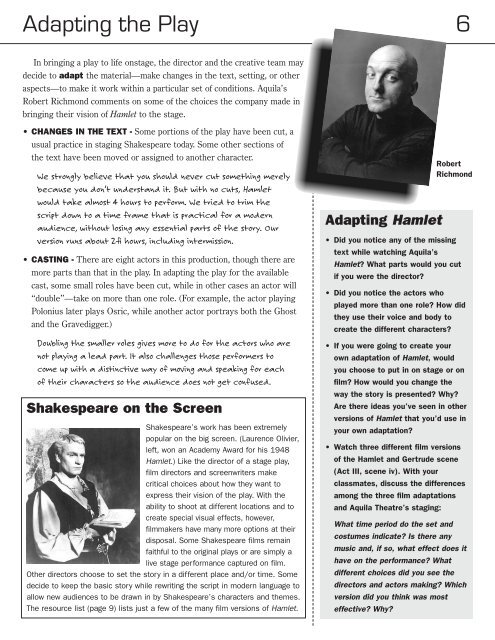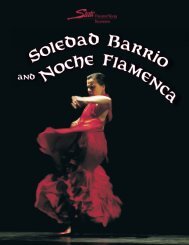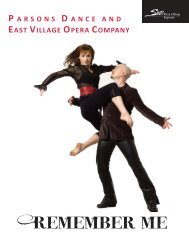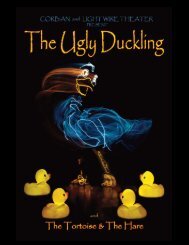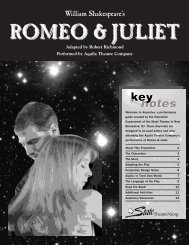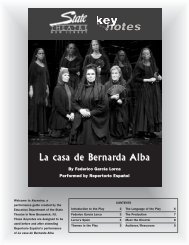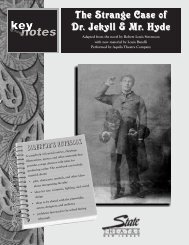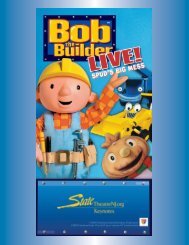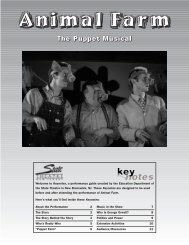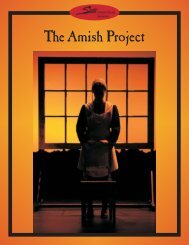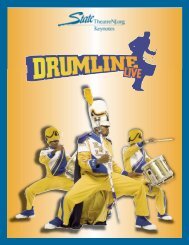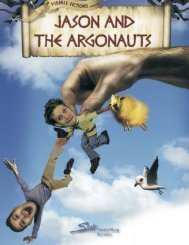Hamlet - State Theatre
Hamlet - State Theatre
Hamlet - State Theatre
You also want an ePaper? Increase the reach of your titles
YUMPU automatically turns print PDFs into web optimized ePapers that Google loves.
Adapting the Play 6<br />
In bringing a play to life onstage, the director and the creative team may<br />
decide to adapt the material—make changes in the text, setting, or other<br />
aspects—to make it work within a particular set of conditions. Aquila’s<br />
Robert Richmond comments on some of the choices the company made in<br />
bringing their vision of <strong>Hamlet</strong> to the stage.<br />
• CHANGES IN THE TEXT - Some portions of the play have been cut, a<br />
usual practice in staging Shakespeare today. Some other sections of<br />
the text have been moved or assigned to another character.<br />
We strongly believe that you should never cut something merely<br />
because you don’t understand it. But with no cuts, <strong>Hamlet</strong><br />
would take almost 4 hours to perform. We tried to trim the<br />
script down to a time frame that is practical for a modern<br />
audience, without losing any essential parts of the story. Our<br />
version runs about 2fi hours, including intermission.<br />
• CASTING - There are eight actors in this production, though there are<br />
more parts than that in the play. In adapting the play for the available<br />
cast, some small roles have been cut, while in other cases an actor will<br />
“double”—take on more than one role. (For example, the actor playing<br />
Polonius later plays Osric, while another actor portrays both the Ghost<br />
and the Gravedigger.)<br />
Doubling the smaller roles gives more to do for the actors who are<br />
not playing a lead part. It also challenges those performers to<br />
come up with a distinctive way of moving and speaking for each<br />
of their characters so the audience does not get confused.<br />
Shakespeare on the Screen<br />
Shakespeare’s work has been extremely<br />
popular on the big screen. (Laurence Olivier,<br />
left, won an Academy Award for his 1948<br />
<strong>Hamlet</strong>.) Like the director of a stage play,<br />
film directors and screenwriters make<br />
critical choices about how they want to<br />
express their vision of the play. With the<br />
ability to shoot at different locations and to<br />
create special visual effects, however,<br />
filmmakers have many more options at their<br />
disposal. Some Shakespeare films remain<br />
faithful to the original plays or are simply a<br />
live stage performance captured on film.<br />
Other directors choose to set the story in a different place and/or time. Some<br />
decide to keep the basic story while rewriting the script in modern language to<br />
allow new audiences to be drawn in by Shakespeare’s characters and themes.<br />
The resource list (page 9) lists just a few of the many film versions of <strong>Hamlet</strong>.<br />
Adapting <strong>Hamlet</strong><br />
Robert<br />
Richmond<br />
• Did you notice any of the missing<br />
text while watching Aquila’s<br />
<strong>Hamlet</strong>? What parts would you cut<br />
if you were the director?<br />
• Did you notice the actors who<br />
played more than one role? How did<br />
they use their voice and body to<br />
create the different characters?<br />
• If you were going to create your<br />
own adaptation of <strong>Hamlet</strong>, would<br />
you choose to put in on stage or on<br />
film? How would you change the<br />
way the story is presented? Why?<br />
Are there ideas you’ve seen in other<br />
versions of <strong>Hamlet</strong> that you’d use in<br />
your own adaptation?<br />
• Watch three different film versions<br />
of the <strong>Hamlet</strong> and Gertrude scene<br />
(Act III, scene iv). With your<br />
classmates, discuss the differences<br />
among the three film adaptations<br />
and Aquila <strong>Theatre</strong>’s staging:<br />
What time period do the set and<br />
costumes indicate? Is there any<br />
music and, if so, what effect does it<br />
have on the performance? What<br />
different choices did you see the<br />
directors and actors making? Which<br />
version did you think was most<br />
effective? Why?


